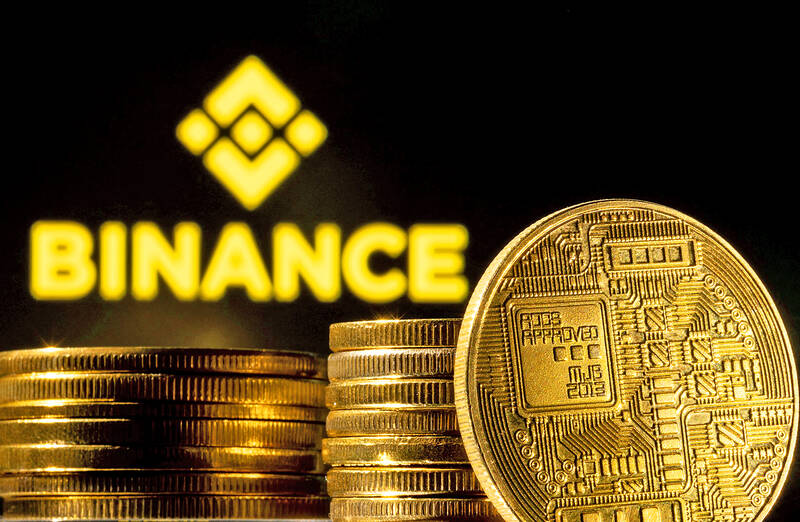Binance restarted withdrawals of bitcoin after citing congestion on the token’s blockchain for two halts in less than 12 hours, suspensions that weighed on cryptocurrency markets.
The company said higher fees have been applied to pending transactions, so they get picked up by bitcoin miners — the computer rigs that operate the network. Withdrawals were down for more than two hours yesterday in Asia.
“To prevent a similar recurrence in the future, our fees have been adjusted,” it said. “We will continue to monitor on-chain activity and adjust accordingly if needed.”

Photo: REUTERS
Binance had also halted bitcoin withdrawals on Sunday for about 90 minutes, blaming congestion on the token’s blockchain.
Data from research company CryptoQuant showed that the platform experienced its highest-ever net daily outflow of bitcoin — a net 175,646 tokens — on Sunday.
Binance moved about US$4.4 billion worth of bitcoin across its digital-asset wallets on Sunday, analysis from CryptoQuant showed.
The tokens were moved in two tranches, of 117,000 and 40,000, CryptoQuant research head Julio Moreno wrote on Twitter.
In Asia, bitcoin was moved “between Binance hot and cold wallets due to the BTC address adjustments,” Binance wrote on Twitter yesterday, referring to bitcoin.
Cold wallets are not connected to the Internet, unlike hot ones, and are often viewed as a more secure way of storing digital currency.
In response to a request for comment, Binance referenced a blog posted earlier this year, in which it said that large crypto exchanges run management systems that operate dynamically with cold and hot wallets for “liquidity and security.”
Last year’s crypto crash and bankruptcies such as FTX undermined confidence in digital-asset platforms.
Lingering skepticism about the industry has left crypto traders on alert for major shifts related to assets at exchanges.
Bitcoin, the biggest cryptocurrency by market value, yesterday retreated amid a wider drop in crypto markets, shedding as much as 3.1 percent before paring some of the slide.
It was trading at US$28,180 as of 7:52am in London.
Binance is by far the largest exchange in the digital-asset sector following the collapse of rival FTX last year. Volumes on the platform exceeded US$6 billion in the past 24 hours, five times as much as the next nearest platform OKX, CoinGecko data showed.
Earlier this year, bitcoin developer Casey Rodarmor released a protocol — called Ordinals — that helps people mint nonfungible tokens (NFTs) on the network. That boosted transactions on the bitcoin blockchain.
NFTs, or digital collectibles, are often based on ethereum, crypto’s most important commercial highway. Their emergence on the bitcoin network represents a new application of a blockchain that is better known for its store-of-value and payment functions.

Taiwan Semiconductor Manufacturing Co (TSMC, 台積電) would not produce its most advanced technologies in the US next year, Minister of Economic Affairs J.W. Kuo (郭智輝) said yesterday. Kuo made the comment during an appearance at the legislature, hours after the chipmaker announced that it would invest an additional US$100 billion to expand its manufacturing operations in the US. Asked by Taiwan People’s Party Legislator-at-large Chang Chi-kai (張啟楷) if TSMC would allow its most advanced technologies, the yet-to-be-released 2-nanometer and 1.6-nanometer processes, to go to the US in the near term, Kuo denied it. TSMC recently opened its first US factory, which produces 4-nanometer

PROTECTION: The investigation, which takes aim at exporters such as Canada, Germany and Brazil, came days after Trump unveiled tariff hikes on steel and aluminum products US President Donald Trump on Saturday ordered a probe into potential tariffs on lumber imports — a move threatening to stoke trade tensions — while also pushing for a domestic supply boost. Trump signed an executive order instructing US Secretary of Commerce Howard Lutnick to begin an investigation “to determine the effects on the national security of imports of timber, lumber and their derivative products.” The study might result in new tariffs being imposed, which would pile on top of existing levies. The investigation takes aim at exporters like Canada, Germany and Brazil, with White House officials earlier accusing these economies of

Teleperformance SE, the largest call-center operator in the world, is rolling out an artificial intelligence (AI) system that softens English-speaking Indian workers’ accents in real time in a move the company claims would make them more understandable. The technology, called accent translation, coupled with background noise cancelation, is being deployed in call centers in India, where workers provide customer support to some of Teleperformance’s international clients. The company provides outsourced customer support and content moderation to global companies including Apple Inc, ByteDance Ltd’s (字節跳動) TikTok and Samsung Electronics Co Ltd. “When you have an Indian agent on the line, sometimes it’s hard

PROBE CONTINUES: Those accused falsely represented that the chips would not be transferred to a person other than the authorized end users, court papers said Singapore charged three men with fraud in a case local media have linked to the movement of Nvidia’s advanced chips from the city-state to Chinese artificial intelligence (AI) firm DeepSeek (深度求索). The US is investigating if DeepSeek, the Chinese company whose AI model’s performance rocked the tech world in January, has been using US chips that are not allowed to be shipped to China, Reuters reported earlier. The Singapore case is part of a broader police investigation of 22 individuals and companies suspected of false representation, amid concerns that organized AI chip smuggling to China has been tracked out of nations such